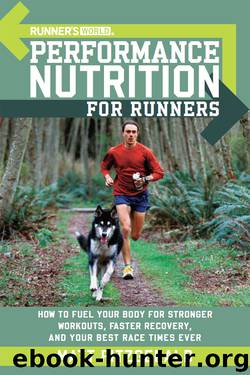Runner's World Performance Nutrition for Runners by Matt Fitzgerald

Author:Matt Fitzgerald
Language: eng
Format: epub
Publisher: Potter/Ten Speed/Harmony/Rodale
Published: 2006-05-14T04:00:00+00:00
Nevertheless, because it involves some very intense running, I don’t recommend that you try this particular carbo-loading regimen for the first time before an important race. Test it initially before a shorter, less important race such as a 10K “tune-up” race that takes place several weeks before your marathon or other “peak” race. While carbo-loading won’t actually affect your performance in a 10K, there’s a slight chance that you won’t recover well from even a small amount of high-intensity running done the day before any race. If you feel sore or flat in this test race, try doing the Western Australia carbo-loading regimen on the second to last day before your next race (e.g., on Friday if it’s a Sunday race). As long as you rest and eat plenty of carbohydrate the following day, your muscles will still be glycogen loaded for your race.
Consuming 12 grams of carbohydrate per kilogram of lean body mass in a 24-hour period is easier said than done. For a 175-pound runner with 15 percent body fat this amounts to roughly 818 total grams of carbohydrate, or roughly the amount of carbohydrate you’ll find in 18 servings of brown rice. The easiest way to get this much carbohydrate in a single day is to supplement normal-size meals comprising carbohydrate-rich foods with several servings of a carbohydrate-rich liquid supplement such as a meal replacement shake (e.g., Ensure, at 40 grams per can) or performance recovery drink (e.g., Endurox R4 at 52 grams per 12-ounce serving). See this page for a sample of a 24-hour carbo-loading schedule.
Your pre-race dinner should be selected with special care. Once my wife made her special gumbo for my family the night before my brothers and I were to run a half-marathon together. The gumbo was delicious, but—please pardon my frankness—it set our bowels on fire the next morning. The moral of the story is that, besides choosing a meal that is rich in carbohydrate, you should also avoid foods that are likely to misbehave in one way or another once inside you. In particular, I would avoid spicy foods (gumbo, curry), greasy foods (fried seafood, french fries), and high-fiber foods (beans, onions).
A lot of runners have a ritual pre-race dinner. This is a good practice because it takes the worry and risk out of the situation. If your favorite pre-race dinner has always worked in the past, it will almost certainly work next time. Indeed, while there are dozens of menus that would probably work equally well on a strictly physical level, when you get down to within 16 hours of a big race and your nerves are raw, any little psychological boost is well worth getting. And the confidence that comes from eating a ritual pre-race dinner does provide a nice little boost for many runners.
When you’re away from home for a race you have a little less control, of course. You can always rent a room with a kitchenette so you can prepare your pre-race dinner just the way you like it, but in my view that’s a little too uptight.
Download
This site does not store any files on its server. We only index and link to content provided by other sites. Please contact the content providers to delete copyright contents if any and email us, we'll remove relevant links or contents immediately.
Born to Run: by Christopher McDougall(7130)
Bodyweight Strength Training Anatomy by Bret Contreras(4687)
Dynamic Alignment Through Imagery by Eric Franklin(4218)
Men's Health Best by Men's Health Magazine(2607)
The Coregasm Workout by Debby Herbenick(2274)
Starting Strength by Rippetoe Mark(2134)
Relentless by Tim S Grover(2090)
Endure by Alex Hutchinson(2029)
Core Performance Essentials by Mark Verstegen(2015)
Bigger Faster Stronger by Greg Shepard(1978)
Relentless by David Gething(1905)
Weight Training by Thomas Baechle(1776)
Runner's World Your Best Stride by Jonathan Beverly(1763)
Relentless: From Good to Great to Unstoppable by Tim S Grover(1702)
Practical Programming for Strength Training by Mark Rippetoe & Andy Baker(1626)
The Stretching Bible by Lexie Williamson(1592)
The Spartan Way by Joe De Sena(1581)
Good to Go by Christie Aschwanden(1483)
Dr. Jordan Metzl's Running Strong by Jordan Metzl(1413)
